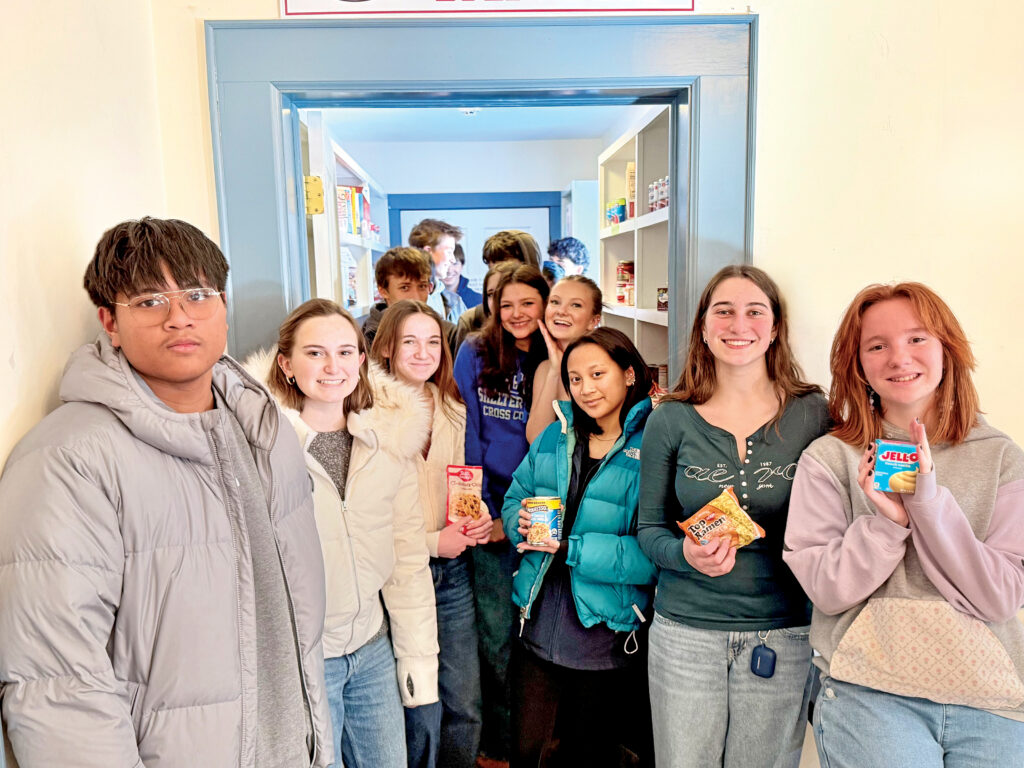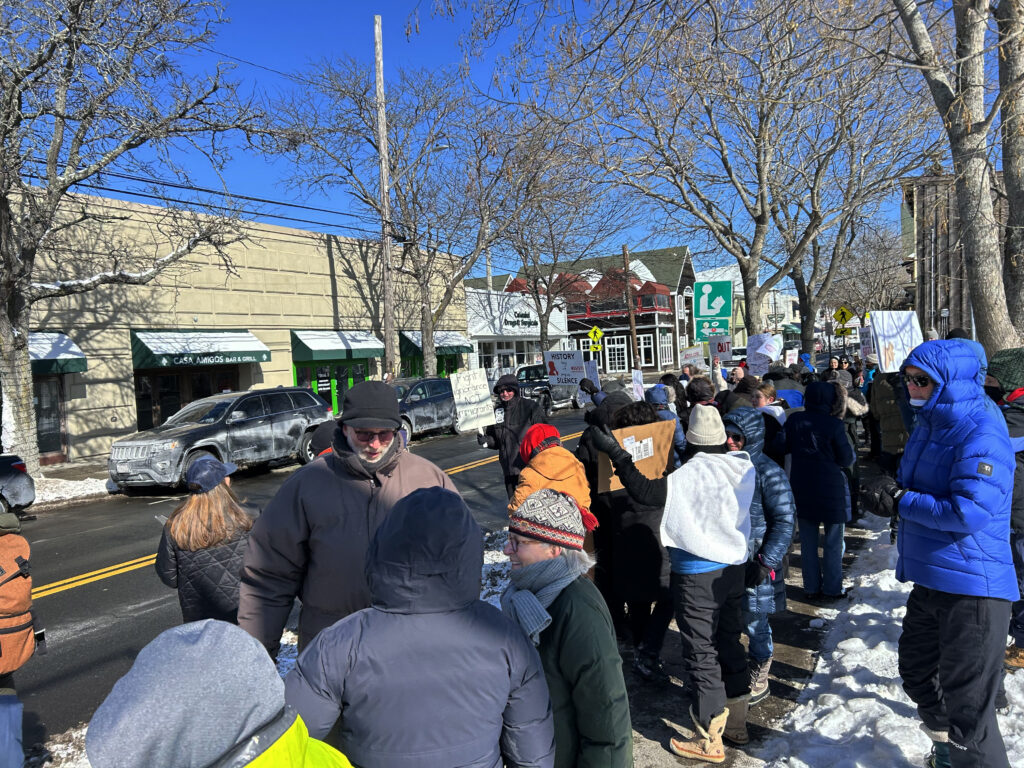Immigration crackdown has Shelter Islanders on edge: Uncertainty and worries in Latino community

Concern. Worry. Fear. Scary.
Those are some words used by several Island residents, immigrants who are American citizens, describing the emotions running through the Latino community in the wake of the Trump administration’s accelerated search for undocumented immigrants to arrest and deport them.
“People are worried,” Jose Montalvo said.
A member of the Building and Maintenance Department team at Shelter Island School, Mr. Montalvo also has his own business, J&M Home Repair. Born and raised in the Dominican Republic, he immediately knew he had found a place to call home more than 30 years ago, when he arrived on Shelter Island, age 26. In 2010, Mr. Montalvo became a citizen of the United States.

Jose’s and his wife Maggie’s family includes his son Jose Jr. married to Karina Montalvo, who serves on the Board of Education; Maggie’s son Michael Martinez; his nephew, Tony Montalvo Jr., who is married to Stephanie Tybaert; daughter Abigail Montalvo Savoye and son-in-law Scott Savoye; and daughter Paola Romero. “Many people I’ve spoken to are really worried that ICE [Immigration and Customs Enforcement] will come to the Island,” Mr. Montalvo said.
Although he found a home and a welcoming community, it was not all clear sailing when he arrived, he said. On Shelter Island he found himself with the same challenges so many immigrants to America have faced over the past two centuries, of looking for work and trying to navigate a new language and culture. “It was tough,” he has said. “Really tough at times.”
In addition, he experienced a few instances of bigotry due to the color of his skin and his ethnicity. “Some people just don’t like you,” he said with a shrug.
Although the roll-out of new federal policies has been chaotic — the leadership of ICE has seen several shake-ups, immigrants flown to Panama were then re-routed to another Latin American country, and some sent to the federal prison at Guantanamo Bay, Cuba, were also re-transported after several days — the Trump administration has left no doubt about their intentions.
Deputy U.S. Attorney General Emil Bove said recently: “We will support everyone at the federal, state, and local levels who joins this critical mission to take back our communities. We will use all available tools to address obstruction and other unlawful impediments to our efforts to protect the homeland. Most importantly, we will not rest until the work is done.”
Mr. Montalvo said that even though there have been genuine worries, for the most part Islanders have stood with their Latino neighbors — especially two of the key institutions here, the Police Department and Shelter Island School. Late last month, School Superintendent Brian Doelger, Ed.D., said, “All of our policies contain the authority and responsibility to safeguard and ensure the well-being of all of our students, irrespective of their immigration status.”
A concentrated outreach to immigrants has been stepped up over the past couple of years to bring immigrant parents closer to the school community. Outreach to the parents includes scheduling events for parents of all students to get to know one another and offering assistance to parents learning English.
Since 2000, the Hispanic population grew on Shelter Island from 2% of the population (53 people) in 2000 to 8.9% (289 people) of the population, according to the Shelter Island Comprehensive Plan Update of September 2023. School enrollment of students who identify as Hispanic or Latino counts 51 students, or 30% of the student body, according to New York State Education Department data for the 2023-2024 school year.
Police Chief Jim Read reiterated his Department’s “long-standing history of working collaboratively with all members of our community and that commitment will not change,” he said. “Our primary goal is to ensure that everyone feels safe and comfortable seeking assistance from the police.”
Immigration remains a federal responsibility carried out by ICE agents, and the Shelter Island Police Department “will not be involved in its enforcement,” Chief Read said. His stance is the same as that of other East End police departments. As for any attempt by ICE agents entering the school, the chief said he and his officers “prioritize protecting vulnerable populations, especially children.”
Mr. Montalvo called the school and Police Department’s statements “a really good thing.” He’s heard from many people who support immigrants’ rights. “We’re a small community, where everyone knows everyone, and everyone knows the Latino community is made up of hard-working, good people. You have to worry what will happen.”
PATHWAYS
Moises Cerdas is a builder and general contractor with his own company, Moises Cerdas, Inc. “A lot of people are worried,” Mr. Cerdas said, “and people who are here as citizens are more worried than those who are not.” Undocumented immigrants are often less informed, he said. “They’re humble people, who just want to work” and be left in peace.
Born in Costa Rica, Mr. Cerdas has been a U.S. citizen since 1991. He contracts with plumbers, electricians and others in the building trades, 80% of whom are Latino, he said. He hears from them that “they came with the dream to be citizens, and there was a way to find out how to do it and apply,” but these days there are roadblocks on the citizenship path.
“Now, it seems that five out of 10 can qualify for citizenship,” he said. “When I came it was 10 out of 10. These guys are craftsmen, with families, who work hard, who show up to do the work.” They should be welcomed, he added, instead of being frightened of the government. “Get a system so you can have a place here.”
A SCARY TIME
“People are scared,” said Pepe Martinez, who owns and runs Stars Café in the Heights with his wife, Lydia Martinez Majdišová. Both are immigrants, Mr. Martinez from Mexico and Ms. Martinez Majdišová from Slovakia, and both are U.S. citizens. Besides operating the popular café, the couple are involved in many community activities, with Ms. Martinez Majdišová serving as the current president of the Shelter Island Educational Foundation.
As for the current administration’s policy on immigrants, Mr. Martinez said, “Everyone is worried. It’s a scary time. It feels like certain places were sanctuaries for immigrants, giving people a sense of security, but now no place is safe.”
Rumors are running through the Latino community and it’s difficult to tell what’s true, he said. Recently, someone called him and said that “immigration people were on the Island, and someone later said they saw an immigration truck. If they’re here, it could be that someone had an appointment with them but missed it and they came looking. Or something else.”
Mr. Martinez has been caught up in the frightening situation of the government coming down on you over immigration status. Born in Tampico, Mexico, as a young man he entered the United States illegally to work picking fruit in farm fields. He came to the East End in the 1990s and managed to sort out his immigration status to get a green card to live and work here legally.
In 2010, Ms. Martinez Majdišová took their children, Emma and Sebastian, to Slovakia for an extended visit and Mr. Martinez went over to spend Christmas and then returned to the States alone, while his wife stayed on for a while.
Going through immigration at JFK, he was taken aside, questioned, and then told to make an appointment with a judge. When he did, he was taken into custody and held for six weeks in a New Jersey immigration facility.
“There I was, with two little children,” Ms. Martinez Majdišová remembered. The six weeks felt like an eternity “because we didn’t have a clue how long it would take. Horrible. But he had a persistent lawyer who was daily annoying the heck out of the judge and the immigration officers.”
With the financial and emotional support of several Islanders — Marie Eiffel was heroic in helping — and Island institutions, especially Father Peter DeSanctis and members of Our Lady of the Isle parish, the family pulled through.
On his release, Mr. Martinez immediately began the process of becoming a citizen. The long process was made longer when Superstorm Sandy in 2012 and a federal government shutdown canceled appointments with immigration authorities. But he was persistent, and achieved U.S. citizenship in April 2017.

As a businessman who employs people, Mr. Martinez is close to the situation — “Just like other businesses, like restaurants and landscapers here” — and has nothing but praise for “the good guys who are working hard, who don’t know their status, who just come here for the dream of a good life.”
He also had good words for the school — Emma is a graduate and Sebastian is in high school — and the Police Department’s position.
“A community, togetherness, a place are built on trust,” Mr. Martinez said. “But if we lose that trust, we don’t have a community anymore.”









